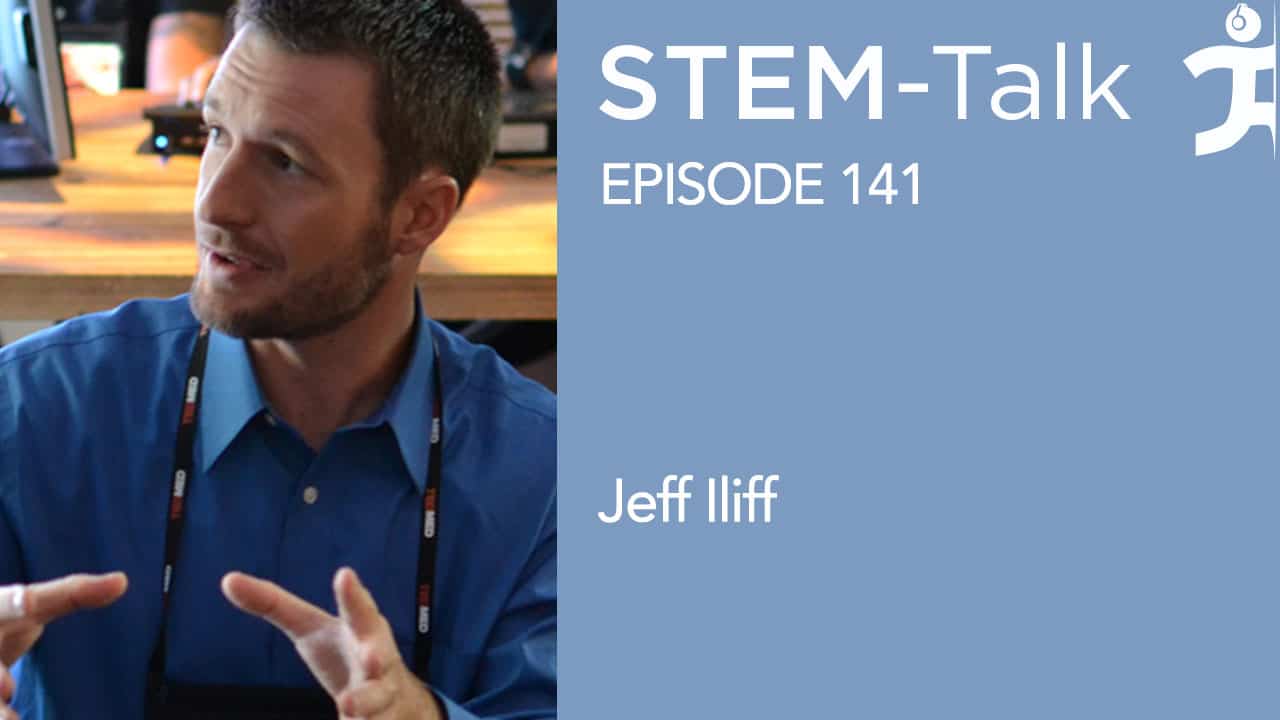STEM-Talk
Episode 141: Jeff Iliff on newly discovered system that clears waste from the brain
// Sep 1, 2022

Our guest today is Dr. Jeffery Iliff, a professor of psychiatry and behavioral sciences in the Department of Neurology at the University of Washington. Much of Jeff’s research focuses on neurodegeneration and traumatic brain injury.
He is the associate director of research at the VA Puget Sound Health Care System and a co-leader for research at the University of Washington’s Alzheimer’s Disease Research Center.
In this episode, we talk about Jeff’s investigations into the glymphatic system, which is a newly discovered brain-wide network of perivascular spaces that facilitates the clearance of waste products from the brain during sleep. Jeff goes on to describe how he is exploring how the glymphatic system fails in the aging brain as well as in younger brains after traumatic brain injury.
Jeff and Dawn also have a conversation about their collaboration on a research project that’s focused on how extreme stressors impact the glymphatic system. Together they are investigating a potential approach to optimizing glymphatic clearance for individuals with acute or chronic sleep deprivation.
Show notes:
[00:02:55] Dawn opens the interview asking Jeff where he grew up. [00:03:21] Dawn asks what Jeff what he was like as a kid. [00:04:01] Ken mentions that it wasn’t until Jeff was working as a lifeguard at a boy scout camp that he first became interested in science. Ken asks Jeff what it was about his lifeguard experience that triggered the interest. [00:05:06] Dawn asks what led Jeff to the University of Washington as an undergrad. [00:06:02] Ken mentions that Jeff originally intended on going into pre-med. Ken explains that Jeff changed his mind and asks about a suggestion from a girlfriend that caused Jeff to have a change of heart. [00:07:39] Dawn points out that in addition to working in the lab as an undergrad, Jeff also worked a 48-hour shift as an EMT over the weekends. Dawn asks Jeff why he kept such a busy schedule. [00:09:35] Ken asks what led Jeff to the Oregon Health & Science University for his Ph.D. [00:10:53] Dawn asks if it’s true that Jeff’s wife played a big role in his decision to travel across the country to New York for his post-doc at the University of Rochester. [00:13:06] Dawn mentions that after the second year of Jeff’s post-doc, he was promoted to a junior faculty position because he was part of the team that discovered a brain cleaning system known as the glymphatic system. The team published a paper in 2012 in science translational medicine that was the first of about ten papers that later became known as the “glymphatic papers.” After a follow-up paper in 2013, Science Magazine cited the discovery that the glymphatic system cleans the brain during sleep as one of the “Top 10 Breakthroughs of 2013.” Dawn asks what this experience was like for Jeff as a young post-doc and junior faculty member. [00:15:55] Dawn explains that the lymphatic system is a network of vessels extending throughout most of the body that transport excess fluid and waste from the interstitial spaces between cells to the blood. She goes on to explain that these vessels are notably not found in the brain leading to the question of how interstitial fluid is cleared in the brain. Jeff’s team discovered the glymphatic system, which serves the same function in the brain as the lymphatic system in the rest of the body. This discovery turned out to be a paradigm shift and led to numerous subsequent studies. Dawn asks Jeff how the initial 2012 study came about and how they identified a distinct clearing system in the brain that serves a lymphatic function. [00:19:59] Dawn mentions that after Jeff’s initial work in the glymphatic system, he went on to write what has become known as his sleep paper. Dawn goes on to say that for this study, Jeff used two-photon microscopy to visualize fluid moving in and out of the brain, and at some point, saw his tracer leaving the brain. Dawn asks Jeff what this experience was like. [00:23:55] Ken asks Jeff to explain the relationship between sleep cycles and the glymphatic system. [00:26:33] Jeff explains some of the differences in sleep between mice and humans. [00:28:35] Ken asks if the critical role of slow-wave sleep in glymphatic function and clearance explains the potential relationship between sleep deprivation and increased risk of neurodegenerative disease. [00:31:29] Ken asks about the impact of sleep deprivation of normal cognitive function. [00:32:43] Ken asks if there is any research on the glymphatic function of APOE4 carriers. [00:35:33] Ken asks about work done by Jeff’s postdoc mentor, Maiken Nedergaard, that suggests that glymphatic function can even be impacted by sleep that is outside the normal circadian rhythm, potentially explaining the increased risk of neurodegenerative disease in shift workers. [00:38:50] Dawn mentions that Jeff’s 2013 sleep paper became the predecessor for many subsequent neuro-imaging studies looking at glymphatic function in the human brain, leading to the pursuit of new neuro-imaging techniques for the measurement of glymphatic function and asks about the developments in this area. [00:42:36] Ken asks about Jeff’s 2014 paper in the Annals of Neurology, in which he proposed that impaired glymphatic clearance contributes to cognitive decline among the elderly and may represent a novel therapeutic target for the treatment of neurodegenerative diseases associated with the accumulation of misfolded protein aggregates. [00:46:44] Ken asks if there is thought to be a connection between glymphatic function and other disorders like Parkinson’s, vascular dementia, etc. [00:48:45] Dawn asks about the meningeal lymphatic system, which consists of lymphatic vessels running parallel to the dural venous sinuses and middle meningeal arteries, and how it relates to the glymphatic system. [00:52:01] Ken asks Jeff why he thinks the glymphatic system had not been identified until recently. [00:54:48] Ken asks about Jeff’s move from the University of Rochester back to Oregon, and how Phil Knight, founder of Nike, played a role in this decision. [00:56:14] Dawn mentions that Jeff was at Oregon for six years, but during this time became connected with a research group at the VA Puget Sound Health Care System in Seattle, which is an affiliate of the University of Washington. Dawn asks what led Jeff to return to Washington, where he currently works as a professor in the Department of Neurology and is the Associate Director for Research at the VA Center, as well as what he and his research group are currently studying. [01:00:24] Ken asks how traumatic brain injury (TBI) affects the glymphatic system. [01:02:44] Dawn mentions that in TBI, Aquaporin-4, or AQP4, is a water channel expressed in astrocytes throughout the central nervous system as well as in epithelial cells in various peripheral organs. The expression of this protein changes in the setting of TBI. She goes on to explain that AQP4 is involved in brain water balance, neuroexcitation, astrocyte migration, and neuroinflammation and is the target of pathogenic autoantibodies in neuromyelitis. Jeff’s 2017 paper in JAMA Neurology looked at how altered AQP4 was associated with aging brains. Dawn asks about this paper, and the implications that the loss of perivascular AQP4 localization may be a factor that renders the aging brain vulnerable to the misaggregation of proteins in neurodegenerative conditions such as Alzheimer’s. [01:05:30] Dawn mentions how the collaboration between her and Jeff’s teams involves working on several studies involving human glymphatic imaging in different settings. Dawn asks Jeff to explain the efforts in validating a non-invasive contrast-free imaging approach to visualizing glymphatic function in humans. [01:08:30] Ken asks Jeff to explain why validating new imaging approaches against intrathecal contrast MRI is so important for the clinical and research communities. [01:12:06] Dawn explains that the first study she and Jeff officially started working on together is funded by the Office of Naval Research, and kicked off in 2021. In this study, they are assessing the impact of extreme environmental conditions on glymphatic function in humans, ranging from hypoxia, hypercapnia, and hyperoxia. Dawn asks Jeff to talk about the status of these studies and their impact on future human glymphatic research. [01:16:28] Dawn asks about a paper Jeff and his team published on astronaut brains post-flight and whether fluid-filled spaces in the brain, known as perivascular spaces, are enlarged post-flight. [01:19:41] Dawn mentions that one of the biggest questions she gets about the glymphatic system is if it can it be ‘fixed’ to function better if it has been impaired. Dawn asks Jeff how he would answer this question based on the current state of research. [01:21:46] Dawn asks Jeff if there are any nutritional or exercise approaches that might help improve glymphatic function. [01:22:53] Ken asks if Heart Rate Variability (HRV) plays a role in glymphatic function. [01:24:52] Dawn mentions that her and Jeff’s collaboration has expanded to include Dr. Miranda Lim at Oregon Health and Science University, Dr. Don Tucker at the Brain Electrophysiology Lab, and Dr. Jeffrey Heys at Montana State University. They are working on DoD funded study to look into a device that could potentially stimulate the glymphatic system in individuals who are acutely or chronically sleep deprived. [02:27:10] Ken asks what should the next key studies in glymphatic research focus on. [01:29:29] Dawn asks if Jeff still takes time off from his lab work to go watch his son’s baseball games and his daughter’s softball games. [01:30:22] Ken asks if it’s true that Jeff is a huge fantasy football fan, and that when he was a post-doc fellow, he and some colleagues started a fantasy football league that is still going on all these years later. [01:32:15] Dawn says she assumes Jeff is a Seattle Seahawks fan and asks Jeff if he ever had Russel Wilson on his fantasy football team. [01:33:15] Ken asks if it is true that Jeff’s students are fans of STEM-Talk. [01:34:19] Dawn closes the interview telling Jeff to let his students know to write a review of this episode so they can get a free STEM-Talk t-shirt.





